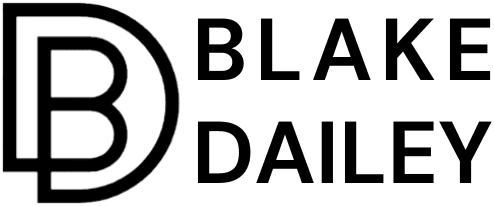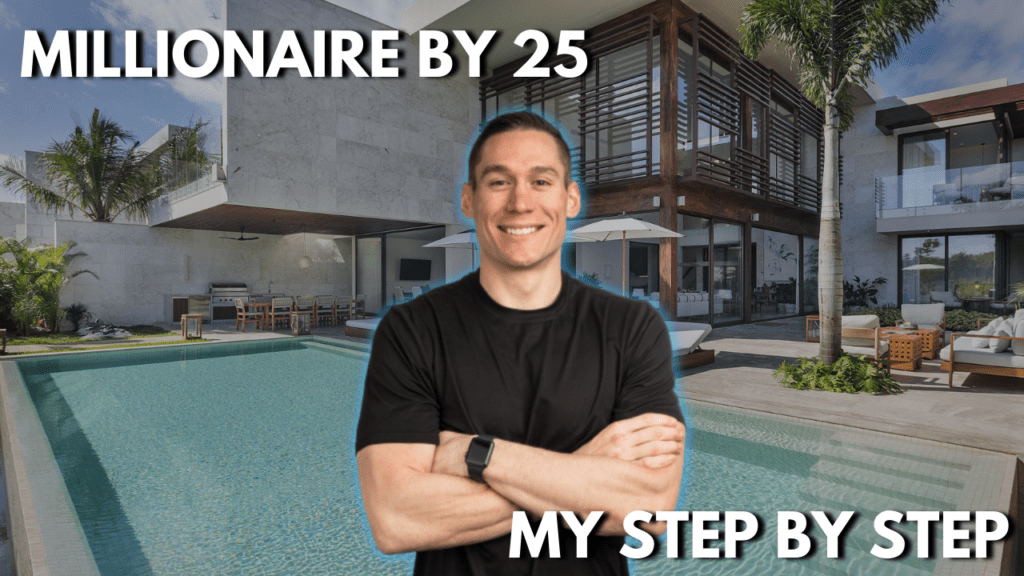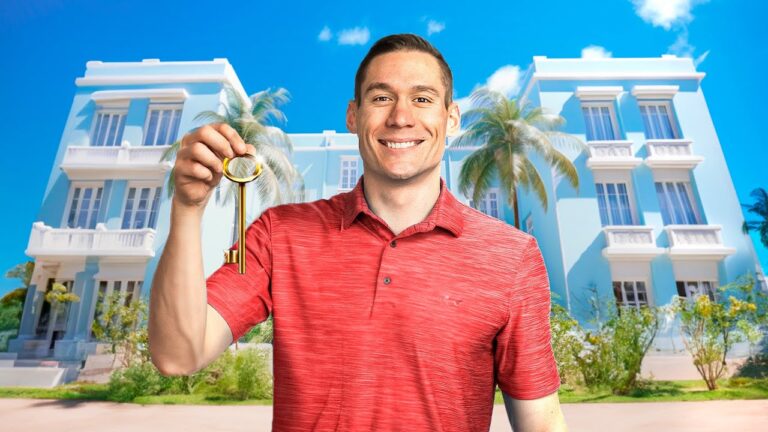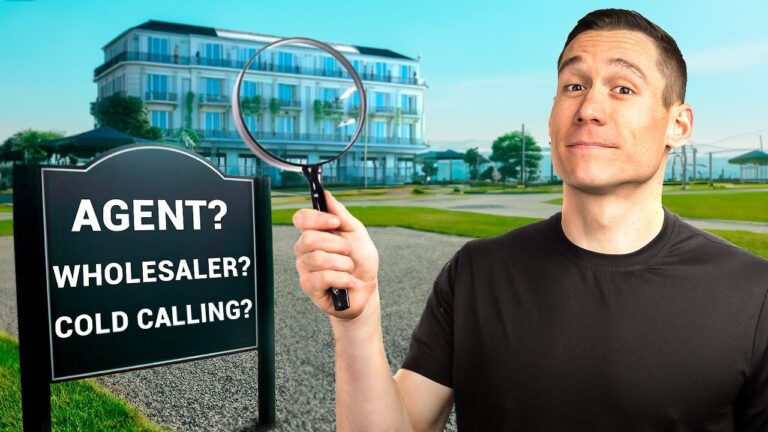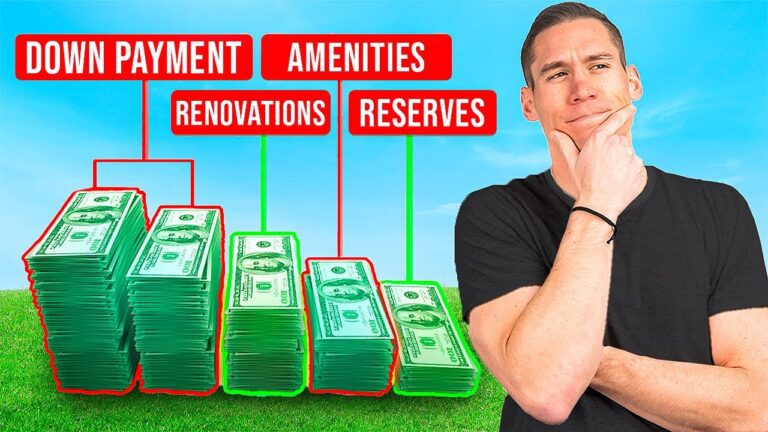I wanted to share my story about how I became a millionaire by investing in real estate by 25.
My background is that I started investing in real estate at 22. I was fresh out of college when I bought my first house and investment property – it was a house hack, meaning it had two units and my wife and I lived in one unit and rented out the other. Since then we’ve grown and scaled and now have 3 houses with 2 units each that are short-term rentals, an apartment complex, and 5 boutique hotels. I actually had all these assets at 24, but we were still renovating so the millionaire mark came later at 25. I want to share this with you guys as a testament to what is possible. You can absolutely become a millionaire in today’s market, it’s just a matter of having a template and taking the action.
So for us, when we got started we only had like $2,500 in our bank account at the time. We had just got married the month before, and I spent most of the money I had on our wedding and honeymoon. Funny side story – I actually had to sell my motorcycle to pay for the wedding, which I got by selling my Jeep because I was heading to the Air Force Academy and underclassmen couldn’t have cars until junior year. So I figured that I’d sell my Jeep because I couldn’t drive it for 2 years anyway. But I still needed a way to get around so I took a little over half the money I sold my Jeep for, I think I sold it for $4,800 and then I bought a Harley Sportster for $2,700. I rode it for 3 weeks, maybe a handful of in the years I was in college when I came home for break, and then sold it to pay for the wedding.
I tell this story to highlight how little money we had at the time. Neither my wife nor I came from families with money, so we had to make it on our own. I grew up with a single mom and my grandparents, who both are modest financially at best. My mom was a bartender, my grandma was a school teacher, and my grandpa worked for the city after serving in Vietnam. Money was always tight one way or the other. My mom was actually on food stamps and I was on the free lunch program all throughout school for low-income families. I didn’t grow up in poverty, I don’t think so anyway, I’m not sure what the poverty line was at the time, and my grandparents helped out a ton. But I grew up in a family where money was always tight, and it was stressed about.
I think the realization of that and experiencing it made me want to have more in life – to be comfortable financially. And I was the kid that always had posters of nice cars on the wall, I remember in particular having a dodge Viper on my wall for years. I always loved that car, and always wanted one of my own. So I wanted nice things, like most people. And I figured that if I could make a lot of money then I could have all the things that I didn’t growing up. That is what inclined me to really like business. I wanted to be the CEO wear a suit to work every day, drive a nice car, live in a nice house, and be able to take awesome vacations to luxurious places. A boy can dream, right?
So I naturally gravitated toward business and took business classes in high school, and competed in business competitions through this program DECA. My group, which was composed of my girlfriend at the time (now my wife) and a few others in my class actually won the Indiana state competition and went on to nationals in Orlando. So I always liked business and felt I was good at it, dealing with people, making tough decisions, and improving things. I went on to major in management at the Air Force Academy and thought I was going to go on to work for some big business after the air force, or even start my own, and chase those dollars. Then around my junior year in college, I read Rich Dad Poor Dad, the genesis of many real estate investors, and got turned onto real estate investing.
I found that real estate combined all the things I had a natural inclination for. So then I dug in hard and found bigger pockets, I read some of Brandon Turner’s books and was completely bitten by the real estate bug.
Along this journey of educating myself and trying to learn everything I could to get into real estate – because at the time I was still at the Air Force Academy and cadets couldn’t own any houses, I think because they found out cadets were buying or renting in the area and then staying off base and getting into trouble, around this time I found out about the VA loan and that I could buy a house with zero down. Even better, I found out I could buy a house with 1-4 units with the VA loan. I could essentially get my first investment property for zero down and live for free by house-hacking. What a great deal right? I thought so. So I dove into that hard.
When we found out we were going to Panama City first, I started scouring Zillow and Realtor.com for houses with multiple units. And also used BiggerPockets to reach out to local real estate agents to let them know what I was looking for. Thankfully I found one of the best brokers in the area, who’s a good friend of mine now, and we identified a house with an extra unit in a good area of town that was move-in and rent ready. It wasn’t a duplex, triplex, or 4 plex like I was looking for, but it was a single-family house with a mother-in-law unit that had its own entrance, and kitchen and was separate from the main home. I found it by scrolling through probably hundreds of listings and noticed that this one had an extra kitchen pictured. It wasn’t in the listing description or advertised but had all the potential to make it into an extra rentable unit. This became my strategy for finding houses that were underutilized or mis-listed and I could turn into cash cows, which I’ll get into in a minute.
So like I said earlier, we had $2,500 in our account at the time we purchased the house. And I think closing costs were $1,800 because we negotiated a slightly higher purchase price with the seller covering most of the closing costs – a great negotiation tip to get into a property for less money out of pocket.
We decided that after looking at the rental rates for the area, we were going to rent the unit out on Airbnb. If we made it a long-term rental, it wouldn’t have rented for enough to cover the mortgage, taxes, and insurance. At the time, I didn’t know much about Airbnb. Nicole and I had stayed at a few in Colorado when she would come out to visit me in college, and we’d usually just stay in the cheapest place we could find because we were college kids without much money. And many of these places were basement apartments or mother-in-law suites. We usually paid around $70-100/night, which was cheaper than a hotel room, and we could have the place to ourselves. So I knew of the appeal from the renter’s standpoint but didn’t know much about being the owner. But I figured if we could rent it out for $70/night at 70% occupancy, we could make enough to cover the mortgage, taxes, insurance, and all the other costs. It turned out we actually cash-flowed $100 after ALL of our expenses including the wifi, utilities, all of it – while living for free!
This pumped me up, especially as a 22-year-old coming from a low-income family as I talked about earlier, with a wife to support. And we were a one-income family at the time because Nicole was still in school getting her doctorate. I was only making $55-60k a year, which isn’t bad right out of college.
Now at the same time, actually before even closing our house and while we were living in base temporary housing at the time, I started writing letters to property owners whose homes had hurricane damage and might want to sell because of the work needed on the house. Panama City got hit by a category-5 hurricane 9 months before we got there. And when we got there it still looked like a warzone in some areas, down houses, holes in roofs, vacant businesses, and debris – I was questioning what the Air Force was thinking sending everyone there. But the base was rebuilding, businesses and houses were getting renovated and built, and the market was on its way to recovering. So in hindsight, it was the perfect time to start buying homes – and that’s before the crazy appreciation we saw over the last 2 years in the post-covid boom.
Since I was bit by the real estate bug, I was all in. I wanted to go fast, and I knew that my ability to use the VA loan was going to be limited. There are rules around it like you only have so much entitlement, you have to live in the house for a year, and the house you buy with it has to be in livable condition (which none of the other early houses I bought were because of hurricane damage). I learned from reading, and listening to podcasts, and interacting in BiggerPockets forums about direct-to-seller marketing. That’s where you find target properties by looking up the seller’s information and reaching out to see if they will sell you their house. And the best way to do that is to find distressed houses or sellers so that there’s motivation for them to sell, and then you make the offer and buy the house.
So I would spend hours driving for dollars, meaning I would drive around neighborhoods and look for distressed houses – the uglier the better! Because I knew if it was really ugly, really damaged, the sellers would likely be more inclined to want to sell the house. So I got really good at identifying the house, looking up their information in the county records, getting in touch with them, and trying to hash out a deal. And at this time I had no real experience, it was all theoretically based on what I had read, watched, and listened to. So I was showing up in these sellers’ living rooms, as a 22-year-old green behind-the-ears kid fresh out of college presenting myself as a real estate investor that could help solve their problem of a distressed house that needed a lot of work. Early on I put my focus on finding GOOD deals because the advice from others that I looked up to and experienced investors said that if you can find a good deal, you’ll find the money that you need to take it down.
So as I was getting good at finding investment properties, I started going to all the local real estate meetups trying to meet other investors and build my network. I would go to everyone that was happening and try to present myself as someone who knew what they were doing. And I had learned enough to sound competent, and was putting in the work to find good deals and bring them into these meetups.
This is how I found my first partners to help me take down a deal that needed a lot of work. I got the contract with the seller at a great price. A price that would make it pretty hard not to make money on the deal.
From these networking events, I found partners for a deal I found. The people I partnered with were wholesalers – meaning they were doing essentially the same thing I was, finding distressed properties, contacting the owners, negotiating good deals, and then instead of buying the property themselves, they would sell the contract to another buyer who would actually close on and take ownership of the house. My skillset exactly! This led me to partner with them and work in their business as an acquisition specialist. This gave me a ton of leads to work that was generated by someone else, so I didn’t have to spend my money on the leads but would contact the sellers, negotiate the contract, and then split the proceeds when we sold the contract to the end buyer.
Doing this got me a ton of reps early on. When you are starting something new your success is really a factor of your time spent, skills built, and repetitions. The more reps – the better you get! Doing higher-volume wholesaling gave me a ton of exposure to finding, analyzing, and negotiating deals. And allowed me to build up the cash I needed to invest on my own again.
Once I had the cash and the skills, I continued to market for my own properties. And I had a niche I really liked – the single-family house with an extra unit that I could rent out both, but purchase for the price of one. I started looking all over my area for houses like our first house and found one a couple of blocks away from where we were living. It was a house with a guest house, with a pool in between. And since I had been learning Airbnb by renting out our guest unit and running it ourselves, I knew that we could do really well by renting out both units of the new house on Airbnb. In the beginning, we did everything ourselves, even cleaning the unit. So I felt like we knew the strategy and the market pretty well. It turned out to be a great call because that unit brings in about $70k/year now and was a huge boost early on!
Now all of this above was in about 6-7 months. From July 19 to Feb 20 we bought our first house hack, did a BRRRR with partners, did 3 wholesales, and bought our second Airbnb rental.
Little did we know covid was about to hit. But we weathered it pretty well, putting TDY or temporary duty military members traveling to the air force base I was stationed at for training, in our Airbnb units. Their per diem made the units do as good as they would if everything was opened without covid. So because we were living for free, our Airbnb and long-term rental were rented without issues, and I had more time on my hands working from home. I dove in even harder in real estate.
Knowing my buying criteria really well – single-family houses with extra units that we could rent both on. I kept looking for those and over the course of the next few months, we bought 2 more, we made one a long-term rental and one a short-term rental, and the wholetailed another one – meaning we got it under contract and then sold it on the MLS. That helped generate extra cash while I was doing rehabs on the other properties. Once the renovations were complete on the new ones, we got to a point where with 6 houses, and 11 units – 8 short-term and 3 long-term, we exceeded my air force W2 income with the net cash flow of our properties. This was all in a year! I was super excited because my 5-year plan when I started was to make as much from my real estate cash flow as I did from the air force. And I realized my goals were too low! I had to think bigger because I absolutely loved what I was doing and I knew that I could turn it into something huge as opposed to something that just allowed me not to have to work once my Air Force commitment was up.
So then I pivoted to commercial real estate and looked at apartment buildings to buy. Because I had the time on my hands, I also started a blog and a podcast talking about my real estate journey, meeting new people, and connecting with investors. After about 8 months of grinding at this while my real estate portfolio was still pumping out cash flow, I purchased my first apartment complex with a group of partners. 66 units in Greensboro, NC. I saw the commercial real estate space as a better leverage on my time because instead of doing a bunch of small deals, I could purchase one larger deal in the same amount of time and have just as much or more cash flow. And as a value-add investor, I liked that commercial properties are valued by their income, not the comps of other properties. So by driving rents and keeping expenses low, we could add huge amounts of value – potentially millions per property.
But this was also around the time that a bunch of stimulus was being pumped into the economy and stocks weren’t doing great, or some sectors were still taking hits. Netflix had rebounded because everyone was on the stay-at-home protocol watching Tiger King. Apartment deals got hard to find because institutional money from wall street and hedge funds and big money investors were fleeting to commercial multifamily as a physical asset and hedge on the unstable market. That made cap rates lower and returns with them.
That pushed me into looking for what I had come to know – short-term rentals. I started looking for dilapidated apartments in good markets where STRs were in high demand and looked at converting them into hotels or Airbnb properties. Looking at that, I found an 8-unit motel in Fort Walton beach that needed some love but was in an awesome spot to convert into an Airbnb property or short-term rental complex.
So I bought that will seller financing and that kicked off my foray into the motel conversions to Airbnb property/boutique hotels that I’ve been doing for the last 2 years and we’ve done really well with it. This started Adventure Stays, the company my partner Jake and I started to buy, renovate, and operate these motel conversion properties. We started to look for undervalued, underutilized motels in great locations that we could turn into trendy Airbnb properties and add new life to the outdated business model of having an office and a vacancy sign to attract guests, and take our presence online.
We got started with 2 in Panama City Beach since I lived there and knew the market well. Pretty soon we had two lined up, Jake found another in South Lake Tahoe since it’s close to where he lives in California, and then we packaged them all together and pitched it to investors, and closed those in the summer of 2021. And after being in the Lake Tahoe market and talking with others there and online we were forwarded another deal and added that one to the portfolio as well. In total, we bought 5 motel conversion to boutique hotel properties for around $8M.
So as of today I own 3 houses in the Panama City area, all have 2 units that are short-term rentals, and the 8 unit short-term rental building in Fort Walton Beach 100% myself. Those have over $600k in equity and produce about $100k in cash flow a year. And Jake and I own 4 of the boutique hotels together, and we have investors in those with a couple of million in equity in the properties. In total, my properties brought in $2.75M in 2022, and 2 of the hotels weren’t live for the entire year. One went live in April and the other in June, so in 2023 they’ll easily bring in over $3M.
Over the course of building our hospitality business over the last year and a half, we’ve separated the property company from the operating company, Adventure Stays being the operating company that runs the operations for the property company, so that gives us value in the equity of the management company that Jake and I own 50/50 based on a multiple of the revenue it generates. So it’s an additional value driver.
So this is really a story about stacking up wins and continuing to take what you’ve learned into bigger opportunities and pivoting when needed. Also leaning into what you really like and are good at. There are a million ways to make a million dollars in real estate – from flipping to wholesaling to rental properties – and I found short-term rentals and commercial real estate as my sweet spots after a lot of repetitions and trying things over the last 3 and a half years.
Real estate is definitely the get-rich-slow game, but short-term rentals are a great way to speed that up. Or partnering on larger deals and taking a smaller piece of a bigger pie. Real estate is a team game and by surrounding yourself with the right people and taking action you can create massive wealth with real estate, especially when you are consistent. And the best part is, you can do that in a reasonable amount of time. If you’re anything like me you’re either too impatient to wait until your 65 to build enough wealth to retire or don’t trust the system, or both. I think real estate investing is the best way to take life into your own hands and build something cool, and profitable for yourself to enjoy now – and at the very least – before you’re 65!
There are also tons of setbacks and frustrations I’ve experienced along the way. I hope this doesn’t come off as it’s easy and anyone can do it because the truth is, it’s actually really hard. And though it’s hard, it’s not that complicated.
When you break my story down, or any millionaire’s path who’s built something and didn’t just have a windfall like winning the lottery or inheriting money, there’s a series of small steps that over time led to bigger and bigger things. I’m not saying my path is right for everyone, but I do hope you see things in there as achievable or helpful. That’s just how I’ve done it.
And if I left anything out or if you have any questions please comment below and I’ll try to shed some more light or provide guidance where I can. I’m an open book because I want to help you on your journey. Lord knows I got a ton of help along the way whether it was from mentors, or reaching out to individuals for advice, or just reading the right book at the right time. So I hope you found the video enjoyable and if you stuck around this long please hit the like button. It helps the channel grow and helps others find this content. And if you want to hear more about how I’ve built our business to generating $3M and buying $15M+ of real estate over the last few years hit the subscribe button and I’ll see you in the next video.
